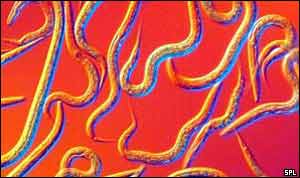 by Flemming Funch by Flemming Funch
The Royal Society: Earth depends on creepy-crawlies. Important thoughts on biodiversity. "We don't know, possibly to a factor of ten, how many species there are on Earth," says professor John Lawton of the Natural Environment Research Council. "But if the better-known ones are reasonably typical, we're looking at an extinction rate a thousand times faster than in the fossil record -- and it's accelerating." Lord May says "Arguably it's the little things that run the world, things like soil microbes. They're the least-known species of all."
Thanksgiving Coffee is now the first private company in California to commit to using 100% bio-diesel in their fleet of trucks. Apparently more than 200 public and government agencies already use biodiesel in their cars and trucks, but this is the first private company.
Kevin Barbieux is homeless. He sleeps in abandoned buildings and shelters. He is also an articulate person who maintains a weblog from the public library.
The Free State Project calls for 20,000 activists to move to one of the U.S. states and peacefully liberate it. I.e. take over its government, through normal elections, and then systematically restore the personal freedoms that gradually have been eroded.
Tinderbox is a program that keeps track of notes in clever ways. One can link them together and assign attributes to them in various ways, and 'agents' are maintaining certain queries on the data. I've gotta try it. Runs in MacOSX.
And somebody mentioned Lotus Agenda. It was a Personal Information Manager from the days of DOS. Which I guess I hadn't paid much attention to at the time. But I was just reading an overview written by its design team. And, wow, it is absolutely brilliant. To me in particular. I've thought long and hard about many of the same things, and those guess express it very clearly. Brilliant people. It was primarily Mitch Kapor's baby, but a large team of people worked on it for 2 1/2 years to create the first release. And it didn't sell much more than 100,000 copies, because people had a hard time understanding what it did. But still today there are enthusiasts who keep it alive. Because it seems that nobody else has been quite able to create a program that lives up to what Agenda's vision was. Anyway, I just downloaded the old program, so let's see if I can get it to work.
I still think that the answer to the question of how to store information with an arbitrary number of categorizations or dimensions, must be inherently simple. There has gotta be some basic form of data structure that is so flexible and universal that all other ways of organizing data - hierarchies, networks, mind maps, relational databases, spreadsheets - will just be subsets or special cases of it. Isn't there some branch of mathematics that has principles that fits the bill? Graph Theory?
"Challenges are what make life interesting; overcoming them is what makes life meaningful." -- Joshua J. Marine
|
|
 by Flemming Funch
by Flemming Funch